Reflective Report on Negotiation Skills Training Event and Development
VerifiedAdded on 2022/08/12
|7
|1442
|19
Report
AI Summary
This reflective report details a student's experience in designing, delivering, and evaluating a negotiation skills training event. It covers key considerations in planning, including needs assessment, learning styles, and delivery methods, as well as the required professional behaviors of a trainer, such as assertiveness and communication skills. The report highlights the key learning gained from the training event, focusing on improved negotiation skills and their importance in both formal and informal business interactions. Furthermore, it explores how the activity shaped and improved the student's strategic understanding of developing training interventions, including the importance of adapting to change and providing incentives. Challenges encountered within the team are also discussed, along with the core competencies developed through the project. The report concludes with references to relevant academic material on training and development.
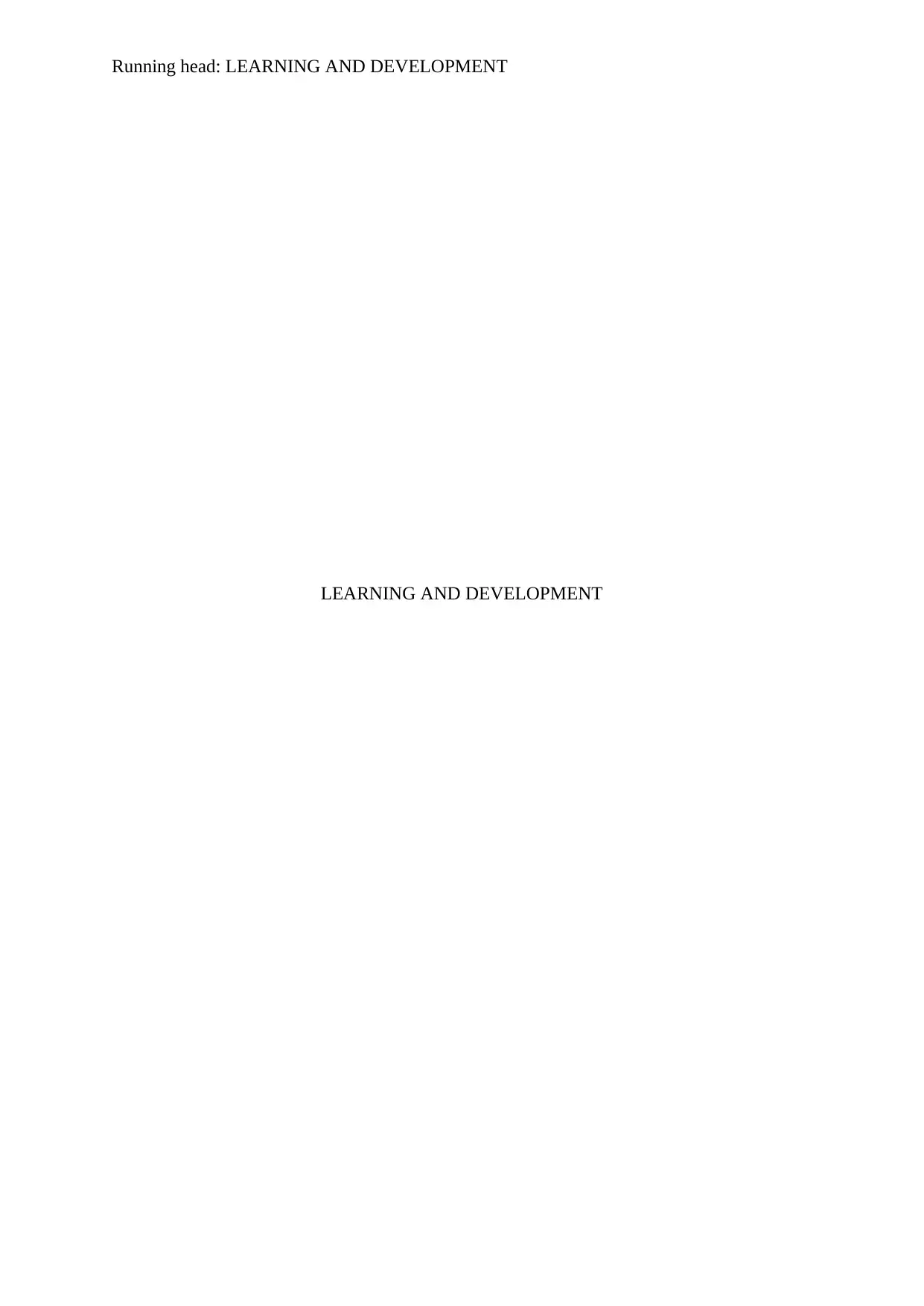
Running head: LEARNING AND DEVELOPMENT
LEARNING AND DEVELOPMENT
LEARNING AND DEVELOPMENT
Paraphrase This Document
Need a fresh take? Get an instant paraphrase of this document with our AI Paraphraser
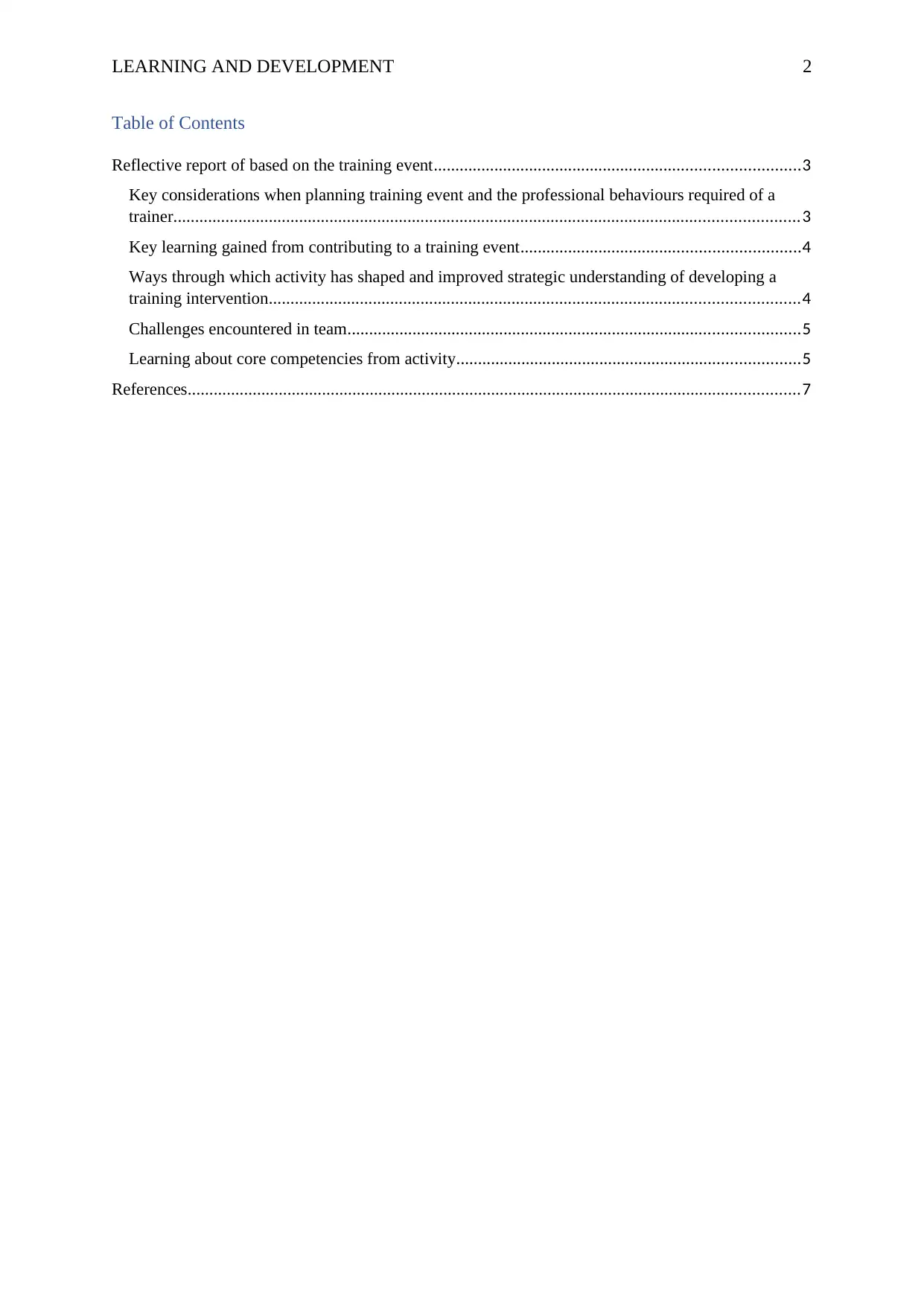
LEARNING AND DEVELOPMENT 2
Table of Contents
Reflective report of based on the training event....................................................................................3
Key considerations when planning training event and the professional behaviours required of a
trainer................................................................................................................................................3
Key learning gained from contributing to a training event................................................................4
Ways through which activity has shaped and improved strategic understanding of developing a
training intervention..........................................................................................................................4
Challenges encountered in team........................................................................................................5
Learning about core competencies from activity...............................................................................5
References.............................................................................................................................................7
Table of Contents
Reflective report of based on the training event....................................................................................3
Key considerations when planning training event and the professional behaviours required of a
trainer................................................................................................................................................3
Key learning gained from contributing to a training event................................................................4
Ways through which activity has shaped and improved strategic understanding of developing a
training intervention..........................................................................................................................4
Challenges encountered in team........................................................................................................5
Learning about core competencies from activity...............................................................................5
References.............................................................................................................................................7
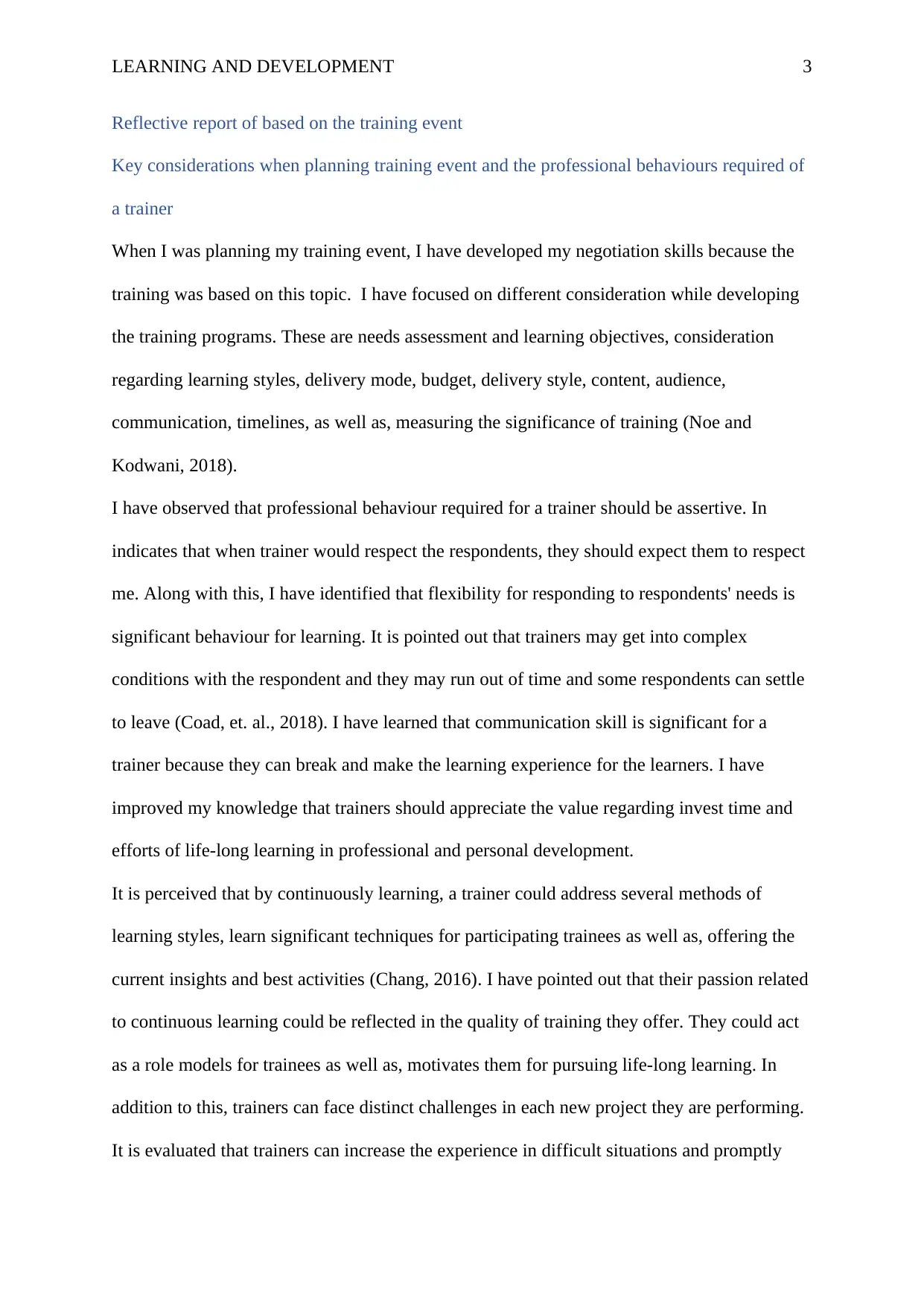
LEARNING AND DEVELOPMENT 3
Reflective report of based on the training event
Key considerations when planning training event and the professional behaviours required of
a trainer
When I was planning my training event, I have developed my negotiation skills because the
training was based on this topic. I have focused on different consideration while developing
the training programs. These are needs assessment and learning objectives, consideration
regarding learning styles, delivery mode, budget, delivery style, content, audience,
communication, timelines, as well as, measuring the significance of training (Noe and
Kodwani, 2018).
I have observed that professional behaviour required for a trainer should be assertive. In
indicates that when trainer would respect the respondents, they should expect them to respect
me. Along with this, I have identified that flexibility for responding to respondents' needs is
significant behaviour for learning. It is pointed out that trainers may get into complex
conditions with the respondent and they may run out of time and some respondents can settle
to leave (Coad, et. al., 2018). I have learned that communication skill is significant for a
trainer because they can break and make the learning experience for the learners. I have
improved my knowledge that trainers should appreciate the value regarding invest time and
efforts of life-long learning in professional and personal development.
It is perceived that by continuously learning, a trainer could address several methods of
learning styles, learn significant techniques for participating trainees as well as, offering the
current insights and best activities (Chang, 2016). I have pointed out that their passion related
to continuous learning could be reflected in the quality of training they offer. They could act
as a role models for trainees as well as, motivates them for pursuing life-long learning. In
addition to this, trainers can face distinct challenges in each new project they are performing.
It is evaluated that trainers can increase the experience in difficult situations and promptly
Reflective report of based on the training event
Key considerations when planning training event and the professional behaviours required of
a trainer
When I was planning my training event, I have developed my negotiation skills because the
training was based on this topic. I have focused on different consideration while developing
the training programs. These are needs assessment and learning objectives, consideration
regarding learning styles, delivery mode, budget, delivery style, content, audience,
communication, timelines, as well as, measuring the significance of training (Noe and
Kodwani, 2018).
I have observed that professional behaviour required for a trainer should be assertive. In
indicates that when trainer would respect the respondents, they should expect them to respect
me. Along with this, I have identified that flexibility for responding to respondents' needs is
significant behaviour for learning. It is pointed out that trainers may get into complex
conditions with the respondent and they may run out of time and some respondents can settle
to leave (Coad, et. al., 2018). I have learned that communication skill is significant for a
trainer because they can break and make the learning experience for the learners. I have
improved my knowledge that trainers should appreciate the value regarding invest time and
efforts of life-long learning in professional and personal development.
It is perceived that by continuously learning, a trainer could address several methods of
learning styles, learn significant techniques for participating trainees as well as, offering the
current insights and best activities (Chang, 2016). I have pointed out that their passion related
to continuous learning could be reflected in the quality of training they offer. They could act
as a role models for trainees as well as, motivates them for pursuing life-long learning. In
addition to this, trainers can face distinct challenges in each new project they are performing.
It is evaluated that trainers can increase the experience in difficult situations and promptly
⊘ This is a preview!⊘
Do you want full access?
Subscribe today to unlock all pages.

Trusted by 1+ million students worldwide
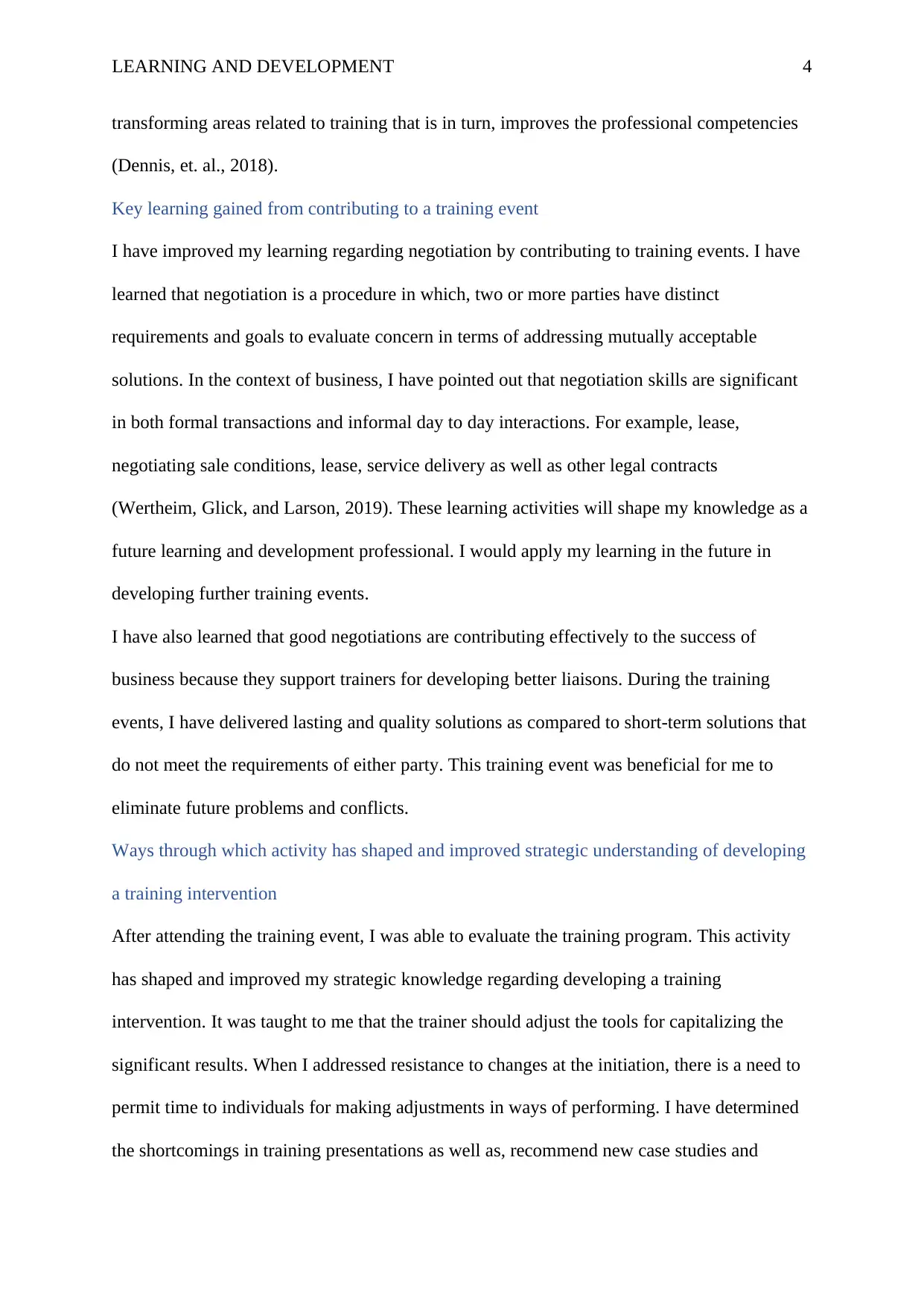
LEARNING AND DEVELOPMENT 4
transforming areas related to training that is in turn, improves the professional competencies
(Dennis, et. al., 2018).
Key learning gained from contributing to a training event
I have improved my learning regarding negotiation by contributing to training events. I have
learned that negotiation is a procedure in which, two or more parties have distinct
requirements and goals to evaluate concern in terms of addressing mutually acceptable
solutions. In the context of business, I have pointed out that negotiation skills are significant
in both formal transactions and informal day to day interactions. For example, lease,
negotiating sale conditions, lease, service delivery as well as other legal contracts
(Wertheim, Glick, and Larson, 2019). These learning activities will shape my knowledge as a
future learning and development professional. I would apply my learning in the future in
developing further training events.
I have also learned that good negotiations are contributing effectively to the success of
business because they support trainers for developing better liaisons. During the training
events, I have delivered lasting and quality solutions as compared to short-term solutions that
do not meet the requirements of either party. This training event was beneficial for me to
eliminate future problems and conflicts.
Ways through which activity has shaped and improved strategic understanding of developing
a training intervention
After attending the training event, I was able to evaluate the training program. This activity
has shaped and improved my strategic knowledge regarding developing a training
intervention. It was taught to me that the trainer should adjust the tools for capitalizing the
significant results. When I addressed resistance to changes at the initiation, there is a need to
permit time to individuals for making adjustments in ways of performing. I have determined
the shortcomings in training presentations as well as, recommend new case studies and
transforming areas related to training that is in turn, improves the professional competencies
(Dennis, et. al., 2018).
Key learning gained from contributing to a training event
I have improved my learning regarding negotiation by contributing to training events. I have
learned that negotiation is a procedure in which, two or more parties have distinct
requirements and goals to evaluate concern in terms of addressing mutually acceptable
solutions. In the context of business, I have pointed out that negotiation skills are significant
in both formal transactions and informal day to day interactions. For example, lease,
negotiating sale conditions, lease, service delivery as well as other legal contracts
(Wertheim, Glick, and Larson, 2019). These learning activities will shape my knowledge as a
future learning and development professional. I would apply my learning in the future in
developing further training events.
I have also learned that good negotiations are contributing effectively to the success of
business because they support trainers for developing better liaisons. During the training
events, I have delivered lasting and quality solutions as compared to short-term solutions that
do not meet the requirements of either party. This training event was beneficial for me to
eliminate future problems and conflicts.
Ways through which activity has shaped and improved strategic understanding of developing
a training intervention
After attending the training event, I was able to evaluate the training program. This activity
has shaped and improved my strategic knowledge regarding developing a training
intervention. It was taught to me that the trainer should adjust the tools for capitalizing the
significant results. When I addressed resistance to changes at the initiation, there is a need to
permit time to individuals for making adjustments in ways of performing. I have determined
the shortcomings in training presentations as well as, recommend new case studies and
Paraphrase This Document
Need a fresh take? Get an instant paraphrase of this document with our AI Paraphraser
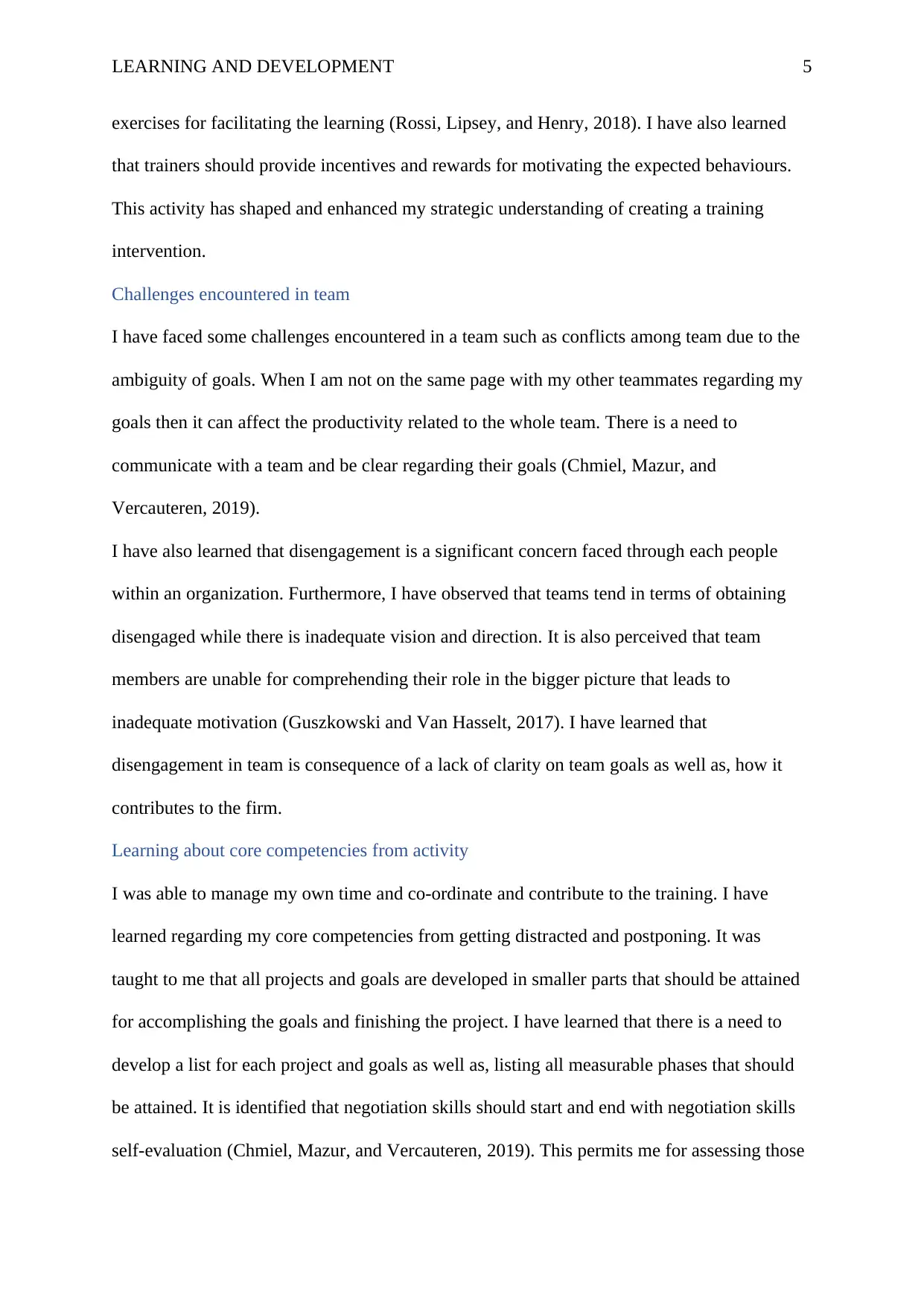
LEARNING AND DEVELOPMENT 5
exercises for facilitating the learning (Rossi, Lipsey, and Henry, 2018). I have also learned
that trainers should provide incentives and rewards for motivating the expected behaviours.
This activity has shaped and enhanced my strategic understanding of creating a training
intervention.
Challenges encountered in team
I have faced some challenges encountered in a team such as conflicts among team due to the
ambiguity of goals. When I am not on the same page with my other teammates regarding my
goals then it can affect the productivity related to the whole team. There is a need to
communicate with a team and be clear regarding their goals (Chmiel, Mazur, and
Vercauteren, 2019).
I have also learned that disengagement is a significant concern faced through each people
within an organization. Furthermore, I have observed that teams tend in terms of obtaining
disengaged while there is inadequate vision and direction. It is also perceived that team
members are unable for comprehending their role in the bigger picture that leads to
inadequate motivation (Guszkowski and Van Hasselt, 2017). I have learned that
disengagement in team is consequence of a lack of clarity on team goals as well as, how it
contributes to the firm.
Learning about core competencies from activity
I was able to manage my own time and co-ordinate and contribute to the training. I have
learned regarding my core competencies from getting distracted and postponing. It was
taught to me that all projects and goals are developed in smaller parts that should be attained
for accomplishing the goals and finishing the project. I have learned that there is a need to
develop a list for each project and goals as well as, listing all measurable phases that should
be attained. It is identified that negotiation skills should start and end with negotiation skills
self-evaluation (Chmiel, Mazur, and Vercauteren, 2019). This permits me for assessing those
exercises for facilitating the learning (Rossi, Lipsey, and Henry, 2018). I have also learned
that trainers should provide incentives and rewards for motivating the expected behaviours.
This activity has shaped and enhanced my strategic understanding of creating a training
intervention.
Challenges encountered in team
I have faced some challenges encountered in a team such as conflicts among team due to the
ambiguity of goals. When I am not on the same page with my other teammates regarding my
goals then it can affect the productivity related to the whole team. There is a need to
communicate with a team and be clear regarding their goals (Chmiel, Mazur, and
Vercauteren, 2019).
I have also learned that disengagement is a significant concern faced through each people
within an organization. Furthermore, I have observed that teams tend in terms of obtaining
disengaged while there is inadequate vision and direction. It is also perceived that team
members are unable for comprehending their role in the bigger picture that leads to
inadequate motivation (Guszkowski and Van Hasselt, 2017). I have learned that
disengagement in team is consequence of a lack of clarity on team goals as well as, how it
contributes to the firm.
Learning about core competencies from activity
I was able to manage my own time and co-ordinate and contribute to the training. I have
learned regarding my core competencies from getting distracted and postponing. It was
taught to me that all projects and goals are developed in smaller parts that should be attained
for accomplishing the goals and finishing the project. I have learned that there is a need to
develop a list for each project and goals as well as, listing all measurable phases that should
be attained. It is identified that negotiation skills should start and end with negotiation skills
self-evaluation (Chmiel, Mazur, and Vercauteren, 2019). This permits me for assessing those

LEARNING AND DEVELOPMENT 6
fields that are my greatest chances to improve in the course of my class. I have also learned
that re-taking self-evaluation at the end of class indicates my learning and those fields need
for continuing to create through training events.
fields that are my greatest chances to improve in the course of my class. I have also learned
that re-taking self-evaluation at the end of class indicates my learning and those fields need
for continuing to create through training events.
⊘ This is a preview!⊘
Do you want full access?
Subscribe today to unlock all pages.

Trusted by 1+ million students worldwide
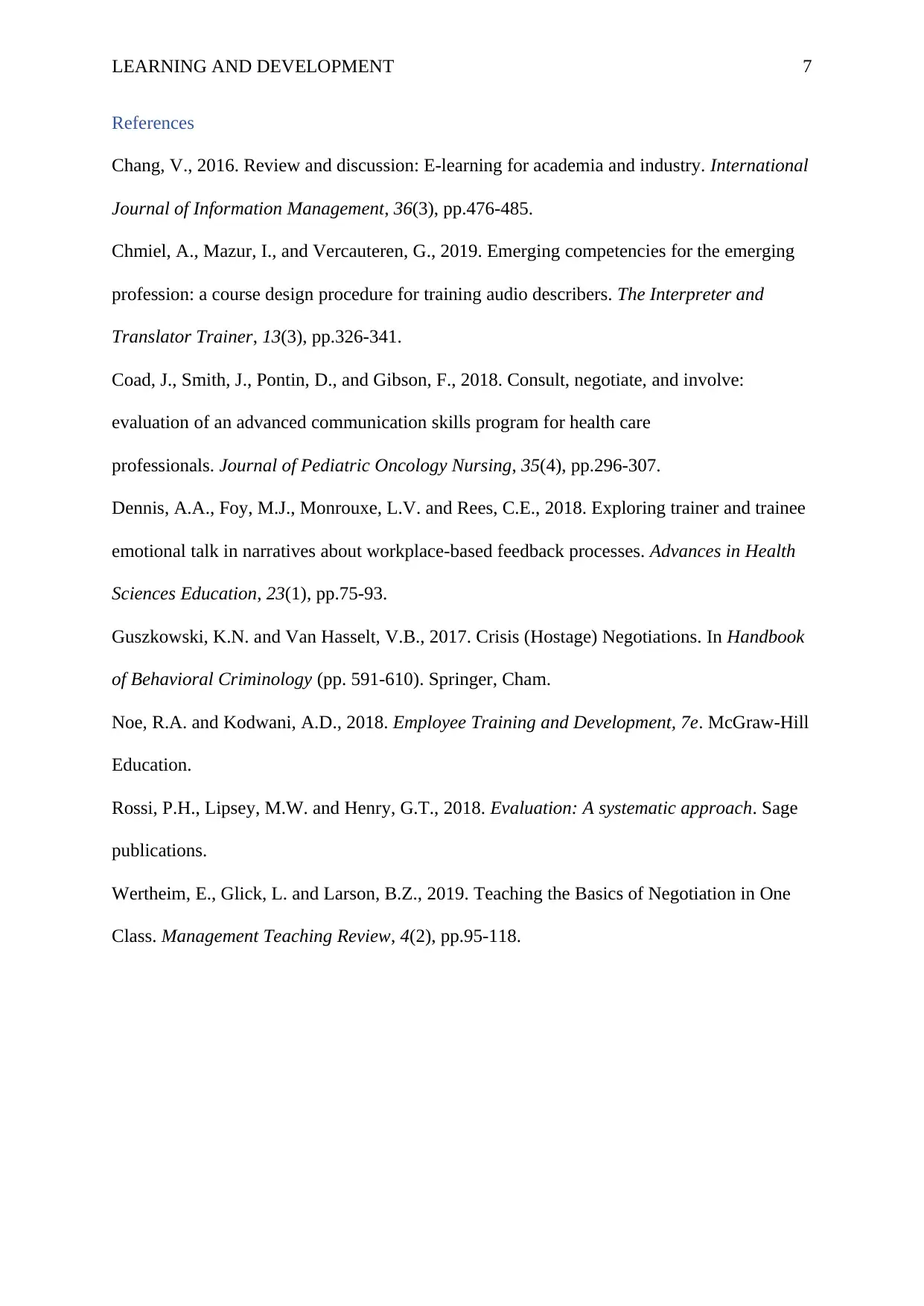
LEARNING AND DEVELOPMENT 7
References
Chang, V., 2016. Review and discussion: E-learning for academia and industry. International
Journal of Information Management, 36(3), pp.476-485.
Chmiel, A., Mazur, I., and Vercauteren, G., 2019. Emerging competencies for the emerging
profession: a course design procedure for training audio describers. The Interpreter and
Translator Trainer, 13(3), pp.326-341.
Coad, J., Smith, J., Pontin, D., and Gibson, F., 2018. Consult, negotiate, and involve:
evaluation of an advanced communication skills program for health care
professionals. Journal of Pediatric Oncology Nursing, 35(4), pp.296-307.
Dennis, A.A., Foy, M.J., Monrouxe, L.V. and Rees, C.E., 2018. Exploring trainer and trainee
emotional talk in narratives about workplace-based feedback processes. Advances in Health
Sciences Education, 23(1), pp.75-93.
Guszkowski, K.N. and Van Hasselt, V.B., 2017. Crisis (Hostage) Negotiations. In Handbook
of Behavioral Criminology (pp. 591-610). Springer, Cham.
Noe, R.A. and Kodwani, A.D., 2018. Employee Training and Development, 7e. McGraw-Hill
Education.
Rossi, P.H., Lipsey, M.W. and Henry, G.T., 2018. Evaluation: A systematic approach. Sage
publications.
Wertheim, E., Glick, L. and Larson, B.Z., 2019. Teaching the Basics of Negotiation in One
Class. Management Teaching Review, 4(2), pp.95-118.
References
Chang, V., 2016. Review and discussion: E-learning for academia and industry. International
Journal of Information Management, 36(3), pp.476-485.
Chmiel, A., Mazur, I., and Vercauteren, G., 2019. Emerging competencies for the emerging
profession: a course design procedure for training audio describers. The Interpreter and
Translator Trainer, 13(3), pp.326-341.
Coad, J., Smith, J., Pontin, D., and Gibson, F., 2018. Consult, negotiate, and involve:
evaluation of an advanced communication skills program for health care
professionals. Journal of Pediatric Oncology Nursing, 35(4), pp.296-307.
Dennis, A.A., Foy, M.J., Monrouxe, L.V. and Rees, C.E., 2018. Exploring trainer and trainee
emotional talk in narratives about workplace-based feedback processes. Advances in Health
Sciences Education, 23(1), pp.75-93.
Guszkowski, K.N. and Van Hasselt, V.B., 2017. Crisis (Hostage) Negotiations. In Handbook
of Behavioral Criminology (pp. 591-610). Springer, Cham.
Noe, R.A. and Kodwani, A.D., 2018. Employee Training and Development, 7e. McGraw-Hill
Education.
Rossi, P.H., Lipsey, M.W. and Henry, G.T., 2018. Evaluation: A systematic approach. Sage
publications.
Wertheim, E., Glick, L. and Larson, B.Z., 2019. Teaching the Basics of Negotiation in One
Class. Management Teaching Review, 4(2), pp.95-118.
1 out of 7
Related Documents
Your All-in-One AI-Powered Toolkit for Academic Success.
+13062052269
info@desklib.com
Available 24*7 on WhatsApp / Email
![[object Object]](/_next/static/media/star-bottom.7253800d.svg)
Unlock your academic potential
Copyright © 2020–2026 A2Z Services. All Rights Reserved. Developed and managed by ZUCOL.





